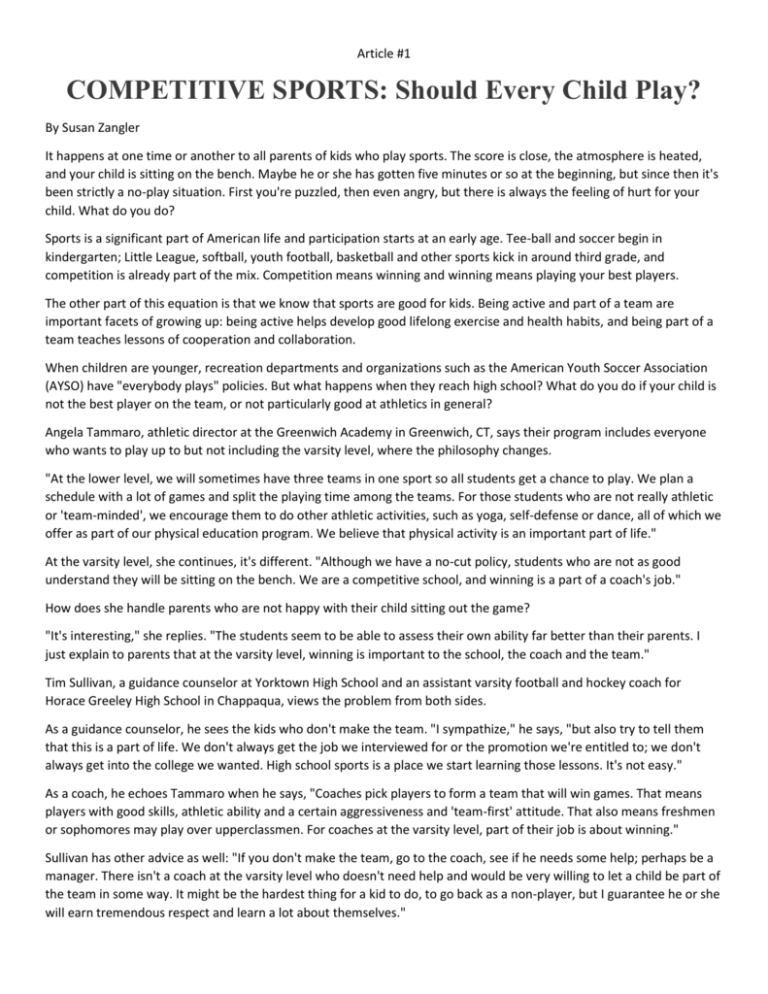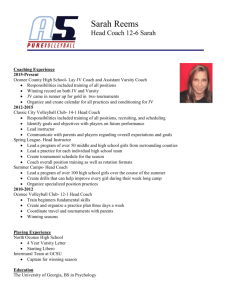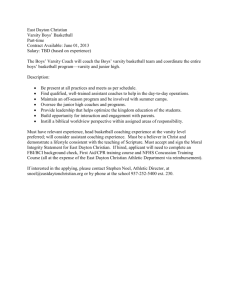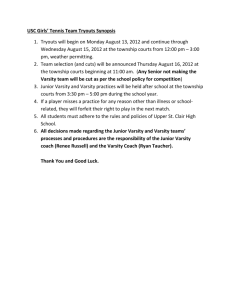COMPETITIVE SPORTS: Should Every Child Play?
advertisement

Article #1 COMPETITIVE SPORTS: Should Every Child Play? By Susan Zangler It happens at one time or another to all parents of kids who play sports. The score is close, the atmosphere is heated, and your child is sitting on the bench. Maybe he or she has gotten five minutes or so at the beginning, but since then it's been strictly a no-play situation. First you're puzzled, then even angry, but there is always the feeling of hurt for your child. What do you do? Sports is a significant part of American life and participation starts at an early age. Tee-ball and soccer begin in kindergarten; Little League, softball, youth football, basketball and other sports kick in around third grade, and competition is already part of the mix. Competition means winning and winning means playing your best players. The other part of this equation is that we know that sports are good for kids. Being active and part of a team are important facets of growing up: being active helps develop good lifelong exercise and health habits, and being part of a team teaches lessons of cooperation and collaboration. When children are younger, recreation departments and organizations such as the American Youth Soccer Association (AYSO) have "everybody plays" policies. But what happens when they reach high school? What do you do if your child is not the best player on the team, or not particularly good at athletics in general? Angela Tammaro, athletic director at the Greenwich Academy in Greenwich, CT, says their program includes everyone who wants to play up to but not including the varsity level, where the philosophy changes. "At the lower level, we will sometimes have three teams in one sport so all students get a chance to play. We plan a schedule with a lot of games and split the playing time among the teams. For those students who are not really athletic or 'team-minded', we encourage them to do other athletic activities, such as yoga, self-defense or dance, all of which we offer as part of our physical education program. We believe that physical activity is an important part of life." At the varsity level, she continues, it's different. "Although we have a no-cut policy, students who are not as good understand they will be sitting on the bench. We are a competitive school, and winning is a part of a coach's job." How does she handle parents who are not happy with their child sitting out the game? "It's interesting," she replies. "The students seem to be able to assess their own ability far better than their parents. I just explain to parents that at the varsity level, winning is important to the school, the coach and the team." Tim Sullivan, a guidance counselor at Yorktown High School and an assistant varsity football and hockey coach for Horace Greeley High School in Chappaqua, views the problem from both sides. As a guidance counselor, he sees the kids who don't make the team. "I sympathize," he says, "but also try to tell them that this is a part of life. We don't always get the job we interviewed for or the promotion we're entitled to; we don't always get into the college we wanted. High school sports is a place we start learning those lessons. It's not easy." As a coach, he echoes Tammaro when he says, "Coaches pick players to form a team that will win games. That means players with good skills, athletic ability and a certain aggressiveness and 'team-first' attitude. That also means freshmen or sophomores may play over upperclassmen. For coaches at the varsity level, part of their job is about winning." Sullivan has other advice as well: "If you don't make the team, go to the coach, see if he needs some help; perhaps be a manager. There isn't a coach at the varsity level who doesn't need help and would be very willing to let a child be part of the team in some way. It might be the hardest thing for a kid to do, to go back as a non-player, but I guarantee he or she will earn tremendous respect and learn a lot about themselves." If these are hard lessons for children to learn, it is sometimes even harder for parents. One Westchester varsity coach who asked not to be identified says he was always amazed at how many parents demanded that the coach put their child on the team. Their attitude, he explains, is that competition is not as important as playing, and that school sports should not be competitive. But, he adds, "These are the same parents who believe that getting their child into a 'competitive college' is the only true goal." There are places where less athletic children can play sports. Maria Fox, senior physical director of the YMCA of Central & Northern Westchester in White Plains, agrees that sports are important, but, she says, "Our philosophy is that every child plays. Our program is geared to the children who didn't make the town or recreation league teams, or who did make them but get locked out of significant playing time, or who are timid about playing because they feel they will 'mess up' and be made fun of. "Our coaches' goals are to make every player feel good about themselves," she says. "At the end of our seasons, we have award ceremonies and everyone gets an award. Our teams build self-esteem because our players feel they've accomplished something." But if your child is one who didn't make the team, remember that sitting on the bench is a life-lesson, hard but true. Our job as parents is to help our children get through it, learn from it, and move on.











